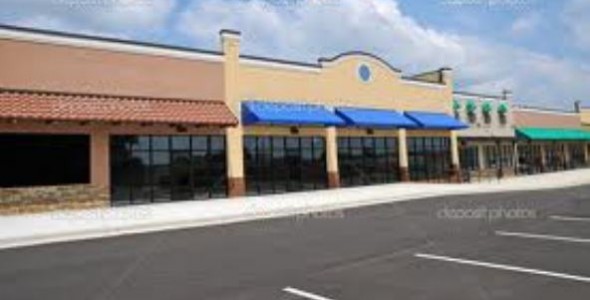

Posted on 02/06/2012 7:05:48 AM PST by SeekAndFind
Remember 2007? Glory days, right? Everything was booming, and nothing was booming quite as much as real estate — especially commercial real estate. Malls, hotels, warehouses, industrial parks: Everything was being built, and everything was being financed on ridiculously generous terms. Remember interest-only loans? Good times.
But commercial real estate is different from residential in one important way: Your standard residential mortgage goes 20 to 30 years. Your standard commercial loan goes for five years, at the end of which you either make a big balloon payment (what it is that balloons remind me of?) or you refinance, the idea being that five years is long enough to get your project built or developed, to secure tenants and leases, get your cash flow flowing, etc. Five years: Seems like it was only yesterday. By my always-suspect English-major math, that means that a whole bunch of commercial mortgages written at that poisonous sweet spot when prices were highest but lending standards were lowest are coming due . . . oh, any minute now.
In New York City alone, there’s about $70 billion worth of commercial mortgages — some of which have been sold off as mortgage-backed securities, naturally — coming due this year. The national total is more than $150 billion, or a bit more than 1 percent of U.S. GDP. That’s going to be a little awkward: The value of U.S. commercial properties has declined by an average of 45.7 percent since their all-time high in 2007, according to Real Capital Analytics. Those 2007 vintage loans weren’t exactly bulletproof: Typical terms included a 20 percent down payment and a five-year payment schedule that required little more than interest payments. An $80 million mortgage on a $100 million property is not so bad, but an $80 million mortgage on what is now a $60 million property is a problem. More than half of the 2007-vintage loans are expected to have trouble refinancing, and maybe well more than half.
This is true even for borrowers who have never missed a payment. Banks are required to take into account a number of factors when rating commercial mortgages. One of the most important is the loan-to-value ratio, which has a lot of borrowers over a particularly uncomfortable barrel: They may have the cash to make their payments, and they may have the cash flow to continue making payments on a refinanced loan, but their properties still are worth less than their mortgages, so nobody wants to refinance. And those are the lucky ones: Just as those loans were mostly for five years, most commercial leases are for about the same length of time. With retail and office-space rentals down, lots of commercial borrowers are sitting on largely vacant properties that are not producing much in the way of cash flow. Among the more high-profile cases, the WTC 3 tower at the World Trade Center still has not located an anchor tenant, which could put the much of the project on ice. Thousands of strip malls across the fruited plains have empty storefronts, and thousands of office buildings have floor upon vacant floor.
Standard & Poor’s advises: “One-third of maturing loans are for office properties, for which five-year lease terms are fairly common — and if tenants don’t renew these leases, securing new, long-term lease commitments may be more difficult in the current environment. Those leases [were] signed in 2007, at peak rents will likely reset to lower levels as five-year leases roll.” S&P’s bottom line: “50%-60% of the 2007 vintage five-year-term loans maturing next year may fail to refinance, and retail loans are at the greatest risk.”
Translation: Armageddon at the strip mall.
And it’s not just a problem for New York City and other big, coastal cities. Richmond, Va., has it worse than Manhattan, Washington, or Los Angeles, according to the local Times-Dispatch, which reports that a dozen large commercial properties have gone into foreclosure recently and that 12 percent of the commercial properties in the Richmond-Norfolk market are “distressed.” In Bergen County, N.J., commercial foreclosures are up 7 percent this year over last year. In the first year of the recession, there were 373 foreclosure actions filed in Bergen County, while in 2011 there were 1,586. Commercial foreclosures are up 10 percent for the state as a whole.
In hard-hit Phoenix, about half of the commercial mortgages backing securities are at risk of default, and a couple of hundred, mostly strip malls and other retail, office buildings, and apartments, already are in default.
Taking a look at the commercial MBS (CMBS) market, Standard & Poor’s issued this advice: “Buckle Up.”
Trepp, a CMBS-analysis firm, in its most recent report (data as of October 2011) finds that the delinquency rate for multifamily-property mortgages is 16.73 percent; for hotels, 14.12 percent and rising; for offices, 8.95 percent and rising; for industrial properties, 11.59 percent and rising; and for retail, a steady 7.61 percent. Trepp managing director Matt Anderson does not sound like a ray of sunshine: “Overall, we do not expect 2012 to be a repeat of 2008, but there will be more disappointments than pleasant surprises in the New Year. The banking sector has not yet returned to ‘normal’ despite two years of earnings growth. With increased regulation and the temptation for banks to take additional risks in order to preserve margins, 2012 should be a very interesting year.”
Not as bad as 2008 — is there a better example of damning with faint praise?
Trepp gets to the real concern here, which is that these mortgages and mortgage-backed securities are sitting on the balance sheets of a bunch of still-wobbly banks. How wobbly? About 100 banks went under last year, and about 250 are expected to go under this year. Trepp finds that, of the banks that went toes-up in 2011, bad commercial real estate accounted for two-thirds of their failing loans.
This is a textbook case for the Austrian business-cycle theory: Artificially low interest rates and loose money produce overinvestment, by both bankers and builders, in a bubble — this time, offices, apartment buildings, and retail space — that can’t be sustained once the artificial stimulation comes to an end, as it must. In this case, that malinvestment has to be worked out at two levels: At the financial level, among the lenders and borrowers, but also at the physical level: There’s going to be a lot of dark storefronts out there, with serious long-term consequences for nearby neighbors and for local real-estate markets: Foreclosures will put more property onto the market, driving down rents and subsequently making existing loans less tenable as the cashflow of commercial properties is diminished. They called the Depression-era tent cities “Hoovervilles.” The next time you see a mile of half-abandoned strip malls, think “Obamaville.”
Not as bad as 2008? Probably not — and let’s hope it is not even close. But there’s a $3 trillion commercial-mortgage market lurking out there, and a lot of CMBS investors — banks and insurance companies in particular — that Washington thinks are “too big to fail,” a problem we persistently refuse to address.
— Kevin D. Williamson is a deputy managing editor of National Review and author of The Politically Incorrect Guide to Socialism, published by Regnery.
We have dozens of strip malls and office parks around here that have never had a single occupant since completion. Most of them were built during the boom, 2002-2006.


What I don’t understand is that around here the commercial landlords are RAISING rents and forcing out tenants even though other parts of that property are vacant and there are all sorts of vacancies.
I would think that if you are having trouble getting tenants you would LOWER rents, but that is not happening. Strange.
They’re raising rents to bolster value so the bank will refi them.
There are at least a few here in Silicon Valley that are either completely empty or have only one of 6-10 units occupied.
18 Amazing Facts About Small Businesses In America
Read more: http://www.businessinsider.com/facts-about-small-businesses-in-america-2011-8?op=1#ixzz1lcE3Gku5
My wish is that a Republican president would surround himself with economic advisers who are familiar with Austrian principles. He could do worse than appoint Ron Paul to his cabinet. Unfortunately, I don't see either happening. Gingrich, Romney, and Santorum, while all pro-free-market to one degree or another, are also completely conventional in their economics: read Keynesian.
In the internet age, commercial real estate may be going the way of the dinosaur.
And yet, the other night, Bill O'Reilly assured us again that the "economy is improving".
On his show, there never is heard a discouraging word that would impact on his best Irish bud, Barry O'Bama.
Leni
meanwhile attornys general are giving cover to banks via a massive scam settlement. It is a scam because the homeowners are being screwed out of their compensation in order to allow a few big shots at places like bank of america to avoid a perp walk.
The irony the mega settlment fig leaf is being pushed by Obama administration and the republican AG are mostly going for it.
Nothing about this scam on CNBC, FNC, or even CNN
Who?
Limbaugh compares O’Reilly to Ted Baxter
by editor on June 10, 2010 
Small banks saved from failure now needing more money
By: Steve Daniels February 06, 2012
http://www.chicagobusiness.com/article/20120206/NEWS01/120209899?template=printart
I’ve NEVER seen so many empty storefronts in MA. To me, that says more than the doctored unemployment rate.
BM
Except in CA where Prop 13 puts limits on how much the property tax can be increased. The alternative is having the state jack up sales tax and income tax with the expectation that some of that flows back to the counties.
The taxes will go up somewhere. That is the point.
Which is the problem with those that say “Starve the beast”. The beast will kill you before it dies. I live on the border with Illinois, and see it all the time.
Disclaimer: Opinions posted on Free Republic are those of the individual posters and do not necessarily represent the opinion of Free Republic or its management. All materials posted herein are protected by copyright law and the exemption for fair use of copyrighted works.